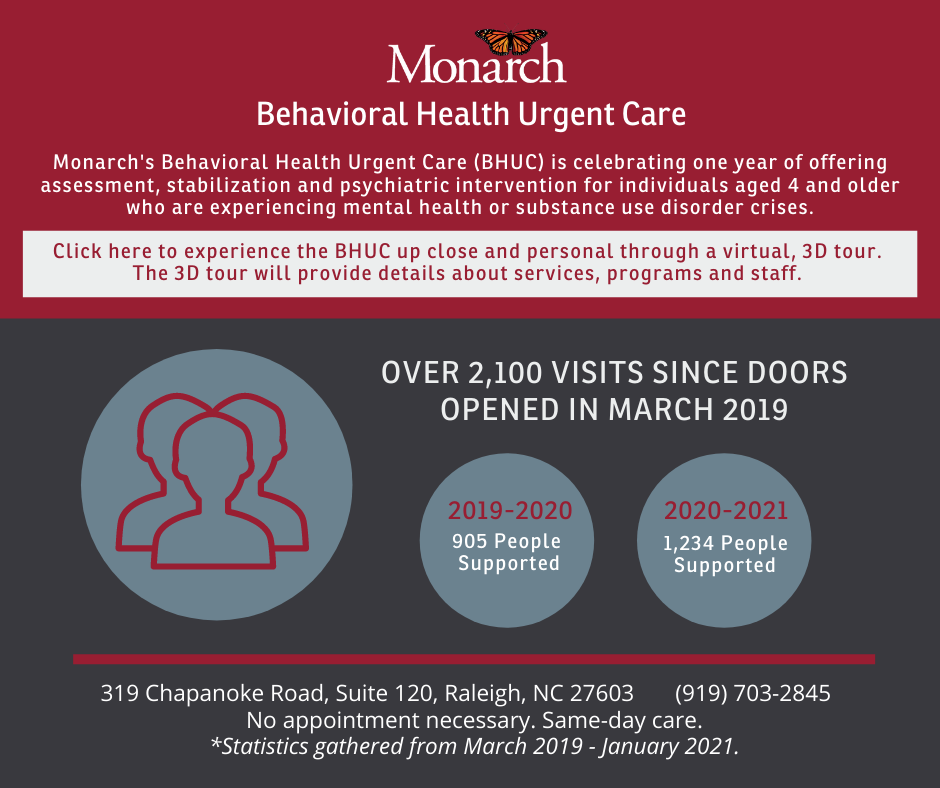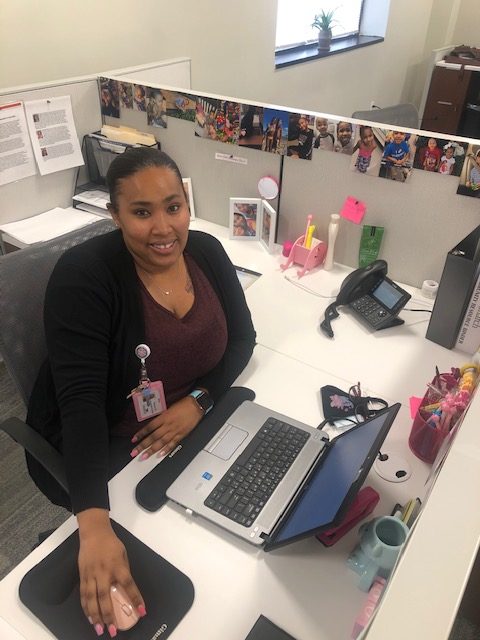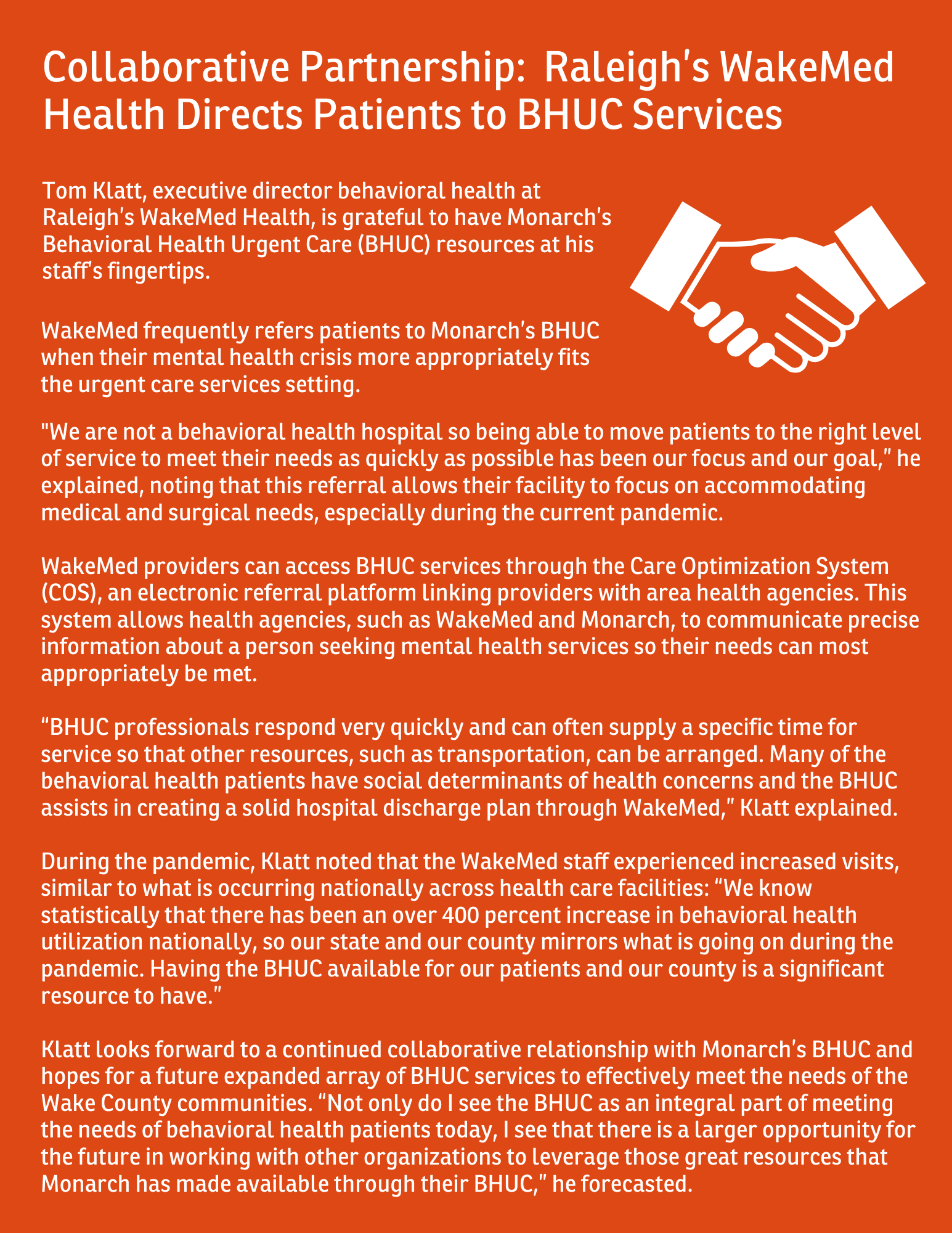Monarch’s Behavioral Health Urgent Care Answer to Pressing Mental Health Crises
 Monarch’s Behavioral Health Urgent Care (BHUC), located in Wake County, has successfully completed its second year of service. Despite the challenges created by a national pandemic, the BHUC continued to deliver compassionate care for people experiencing a mental health crisis.
Monarch’s Behavioral Health Urgent Care (BHUC), located in Wake County, has successfully completed its second year of service. Despite the challenges created by a national pandemic, the BHUC continued to deliver compassionate care for people experiencing a mental health crisis.
In the spring of 2020, the pandemic took hold of everyday life just as the BHUC was completing its inaugural year and making progress introducing Monarch’s mental health crisis services to agencies and communities within Wake County.
The Pandemic Forced Changes
Although the second year looks strikingly different from its kickoff year, people seeking services continued to receive high quality mental health care with pandemic safety measures in place.
The pandemic’s early lockdown restrictions seemed to deter people from reaching out for mental health care, however, as restrictions eased toward the end of 2020, use of BHUC’s services steadily increased with the number of people seeking services quadrupling. During the first quarter of 2020, about 150 people were served as compared to almost 600 receiving services in the last quarter. The increase was attributed in part due to a change in internal processes and also due to the increased and, oftentimes complex, mental health and medical needs of people in crisis.

BHUC Qualified Professional Shannon Hinton serves people in need critical connections to resources.
Coordinating Care: Addressing Mental Health Needs and More
In addition to serving the needs of individuals experiencing a mental health crisis, the BHUC connects people with vital community resources when necessary. The BHUC staff includes psychiatrists, nurses, and administrative assistants, as well as Qualified Mental Health Professional Shannon Hinton, BA, QP.
Hinton, has worked most recently as an administrative assistant at the BHUC and previously as a direct support professional (DSP) within Monarch’s long-term services and supports.
A key component of Hinton’s role is to meet with people supported during their BHUC visit to assess what community resources will complement the mental health services they are receiving. She begins by reviewing their completed social determinants of health survey.
Hinton explained that the survey identifies needs in areas such as housing, food, interpersonal safety or employment. “These are basic needs that a lot of us take for granted that may not be available to them,” she explained, adding that social determinants of health can add to the stress of healing from a mental illness.
The Centers for Disease Control (CDC) defines social determinants of health to include aspects of the social environment, such as discrimination, income, education level, marital status; the physical environment, such as place of residence or crowding conditions; and health services, such as access and quality of care and insurance status.
Connecting People in Need to Resources
Hinton sees her role as a “lifeline” to vital community resources that can improve their quality of life. “It is rewarding being able to help them, be of assistance to the people we support and connect them to services so that when they leave the BHUC, their situation is a little easier for them,” she observed.
Hinton feels the DSP and administrative assistant roles helped prepare her to compassionately provide services in her current role. She acknowledged that being patient during someone’s mental health crisis is key: “They are not the same person when they come in as when they leave. They are experiencing a crisis situation and after receiving services, you can see a weight lifted off their shoulders when they have what they need to go on.”
Hinton, who is currently studying toward earning a master’s degree in social work through Walden University and received her bachelor’s degree in Psychology from William Peace University, has seen how the pandemic’s affects have increased the demand for community resources. “Many people have lost their jobs and need employment resources and can’t pay their housing, utility or meet their prescription medication needs,” she observed.
The social determinants of health survey assists with uncovering their needs so that she can begin the important work of determining and coordinating available services.

Posted on: Thursday April 8, 2021
